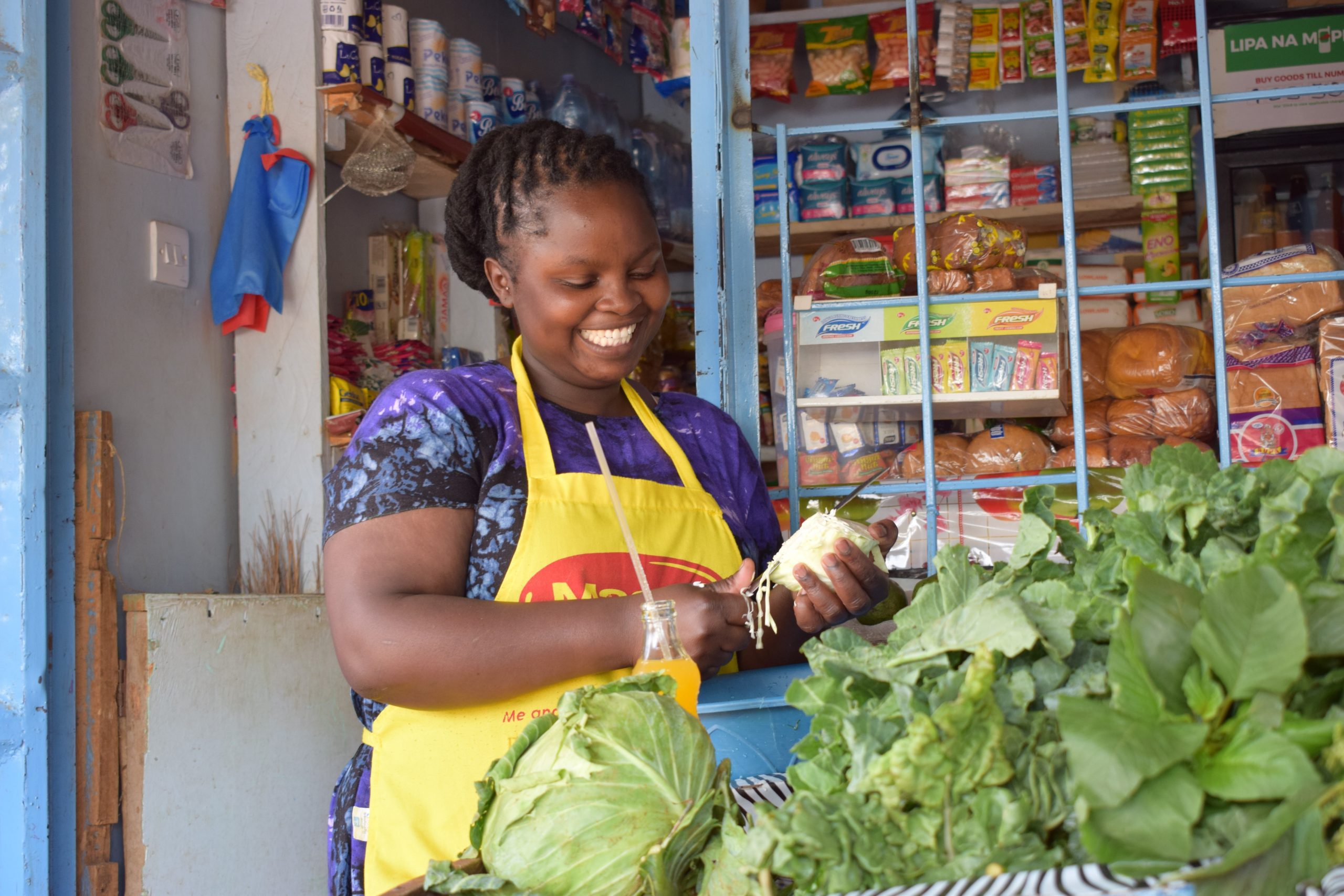Ask a TechnoServe Expert: Alice Waweru on Entrepreneurship and COVID-19
In the "Ask a TechnoServe Expert" series, our staff members answer your questions about the critical global issues they work on every day. In this edition, Entrepreneurship Regional Program Manager Alice Waweru addresses how the COVID-19 crisis impacts small businesses in the developing world.
Entrepreneurship and COVID-19

The COVID-19 crisis has posed an unprecedented challenge for small businesses all over the world. A May 2020 World Bank survey found that over a quarter of these enterprises worldwide were non-operational. Many are still struggling to stay afloat.
In Kenya, micro-retail shops are vital to the local economy. These small businesses often provide up to 80–90% of all consumer goods. Earlier this year, many governments imposed stay-at-home orders and other movement restrictions, which turned small neighborhood shops into essential businesses.
During COVID-19, micro-retail shops have played a critical role in ensuring continued access to essential goods such as food and hygiene products. As the role of small businesses evolves, however, these shopkeepers are now facing immense challenges to keep their businesses afloat.
Alice Waweru, TechnoServe’s entrepreneurship regional program manager, has worked at the organization for the last 14 years. In her role, she supports the growth of micro- and small enterprises (MSEs) in East Africa.
Q1: How are small businesses coping with new requirements / COVID-19 protocols?
– Amos W. Wanyiri
A1: The COVID-19 crisis is creating new challenges for small businesses globally and in Kenya. The combination of lockdowns, curfews, and broader economic disruptions of COVID-19 has made it difficult for micro-retailers to maintain their sales, source supplies, and operate safely.
Without support, many of these small businesses will have to lay off staff or close permanently.”
— Alice Waweru, TechnoServe entrepreneurship regional program manager
Since the beginning of the pandemic, Kenya’s government has been stressing the importance of health protocols, and small businesses have been trying to implement these new safety measures.
Many small businesses are now observing higher levels of hygiene, such as installing handwashing stations outside of shops.
Shopkeepers are also increasingly using mobile money and e-commerce, a phenomenon that was not as common pre-COVID-19. Digital payment options reduce the number of touchpoints and are typically considered more hygienic than cash.
In Kenya, small retail shops known as “dukas” are prime locations for providing accurate information about COVID-19. The government strategically places COVID-19 posters in shops because they know that many people will see them as they shop. Duka owners also play an essential role in the community’s health by selling masks to customers and communicating about health protocols to their families and communities.
Q2: What is the overall impact of COVID-19 on male- versus female-owned businesses?
– Giovanna d’Adda, Milan, Italy
A2: The COVID-19 crisis has affected small businesses in many unprecedented ways. A May 2020 TechnoServe survey on the impact of COVID-19 on micro-retail businesses showed that businesses were reporting a 39% drop in revenue.
When we separated this data by gender, we found that women-owned businesses reported a 46% decrease in revenue, while businesses owned by men reported a 34% decrease in revenue.
Anecdotally, we have seen that since the beginning of the pandemic, women business owners have to focus more of their time, attention, and financial resources on household needs and expenses. As a result, they have less time and money left over to invest in their business.
Both women and men have struggled to access credit from financial institutions, though this is typically more of a challenge for women.
— Alice Waweru, TechnoServe entrepreneurship regional program manager
Overall, it is clear that the pandemic has only exacerbated existing challenges that women entrepreneurs face daily.
Q3: How can TechnoServe assist small businesses to operate and grow in the time of COVID-19?
– Stephen Macharia, Nairobi, Kenya
A3: Since the beginning of the pandemic, TechnoServe has equipped micro-retailers with the tools they need to survive this crisis. We have developed a crisis toolkit to build entrepreneurs’ capacity and help them develop a road to recovery.
TechnoServe is also supporting the entrepreneurs by training them on business survival skills and business continuity planning, as well as by providing guidance on how to cope with operational challenges, such as cash flow crises.
Additionally, we are providing support by linking entrepreneurs to various market actors. For example, we are helping them access finance, markets, and technology to ensure they have access to the capital they need to keep their businesses afloat and avoid supply chain disruptions.
As we have worked closely with micro-retailers, we’ve encouraged them to utilize technology to connect to the supply chain, manage their customers, serve remote customers, and stay connected.
TechnoServe’s programs provide the necessary training to enable micro-retailers to use technology effectively.

Q4: What kind of entrepreneurship produces good profits in this COVID-19 situation?
– P. Rameshbabu, Andhra Pradesh, India
A4: Since the beginning of the pandemic, we have noticed that shops selling essential goods tend to fare better, as these products have a high turnover and are always in demand. It has also been beneficial for shopkeepers to incorporate health products, such as the critical examples below:
- Face masks
- Hand sanitizer
- Soap
In May 2020, 87% of respondents who participated in our COVID-19 impact survey indicated that food products were moving faster than other items in the fast-moving consumer goods category.
Many consumers are now staying at home more often and spending more time on domestic tasks such as cooking. As a result, they are likely to purchase more food items than usual. In addition, businesses built on technology platforms and e-commerce have yielded higher earnings, particularly when there were strict lockdowns in place and in-person shopping was not possible.
As TechnoServe continues to study these patterns, we will tailor our programs accordingly.
Q5: What kinds of innovative approaches should we promote to make sure these small businesses get through the COVID phase?
– Amos W Wanyiri
A5: Wherever possible, TechnoServe encourages entrepreneurs to adopt technology in their businesses for operations such as marketing and digital financing.
We have also urged shopkeepers to consider alternative business models, such as the following:
- Home deliveries
- Packaging services
- Digital payments
Small business owners can leverage social media platforms such as WhatsApp and Facebook to generate new markets and connect to suppliers. TechnoServe also encourages entrepreneurs to develop lasting partnerships with industry players in the micro-retail landscape.




